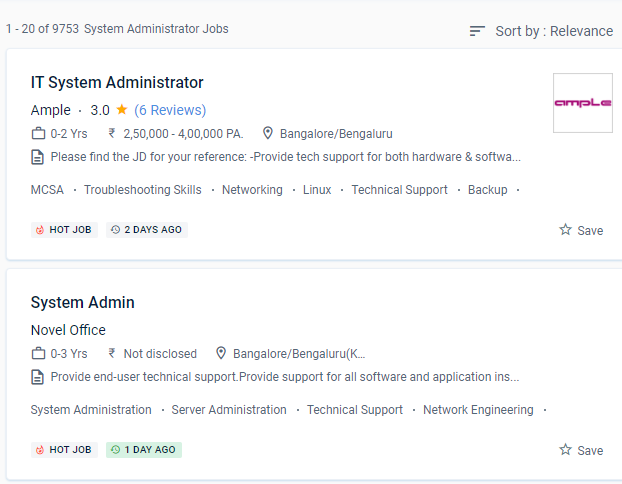System Administration Internship/Course Details


To digitally connect clusters of computers, they create local area networks (LANs) and wide-area networks (WANs).
A system administrator's responsibilities include the following:
System administrators are in charge of managing, maintaining, and configuring commercial computer systems on a day-to-day basis. Students who pursue a diploma in this field have a fantastic opportunity to expand their expertise.
The System Administration course in Delhi will take you from working on a single machine to managing a complete fleet. Network architects have frequently experienced administrators who build data transmission systems from the ground up. Circuit boards and CPUs are assembled by computer hardware engineers to produce functional mobile or desktop devices.
System administration roles are broad and often vary based on the type of computer system being managed, however, the majority of them have some fundamental functions that can be accomplished in a variety of ways.
They install computers, laptops, intranets, servers, cybersecurity software, and other technology. You now understand what system administration entails, as well as the functions that system administrators execute and the talents that system administrators possess. Information security managers are given more duties when it comes to protecting sensitive data from hackers.






 To digitally connect clusters of computers, they create local area networks (LANs) and wide-area networks (WANs).
A system administrator's responsibilities include the following:
System administrators are in charge of managing, maintaining, and configuring commercial computer systems on a day-to-day basis. Students who pursue a diploma in this field have a fantastic opportunity to expand their expertise.
The System Administration course in Delhi will take you from working on a single machine to managing a complete fleet. Network architects have frequently experienced administrators who build data transmission systems from the ground up. Circuit boards and CPUs are assembled by computer hardware engineers to produce functional mobile or desktop devices.
System administration roles are broad and often vary based on the type of computer system being managed, however, the majority of them have some fundamental functions that can be accomplished in a variety of ways.
They install computers, laptops, intranets, servers, cybersecurity software, and other technology. You now understand what system administration entails, as well as the functions that system administrators execute and the talents that system administrators possess. Information security managers are given more duties when it comes to protecting sensitive data from hackers.
To digitally connect clusters of computers, they create local area networks (LANs) and wide-area networks (WANs).
A system administrator's responsibilities include the following:
System administrators are in charge of managing, maintaining, and configuring commercial computer systems on a day-to-day basis. Students who pursue a diploma in this field have a fantastic opportunity to expand their expertise.
The System Administration course in Delhi will take you from working on a single machine to managing a complete fleet. Network architects have frequently experienced administrators who build data transmission systems from the ground up. Circuit boards and CPUs are assembled by computer hardware engineers to produce functional mobile or desktop devices.
System administration roles are broad and often vary based on the type of computer system being managed, however, the majority of them have some fundamental functions that can be accomplished in a variety of ways.
They install computers, laptops, intranets, servers, cybersecurity software, and other technology. You now understand what system administration entails, as well as the functions that system administrators execute and the talents that system administrators possess. Information security managers are given more duties when it comes to protecting sensitive data from hackers.



















































































